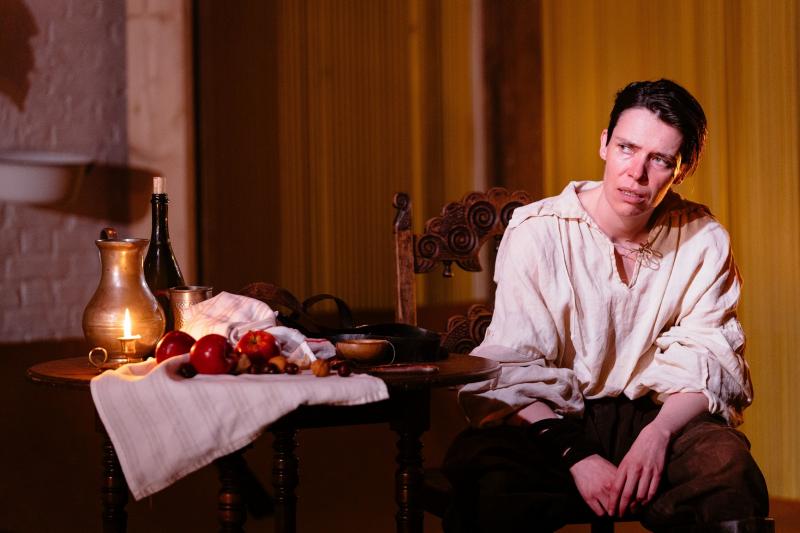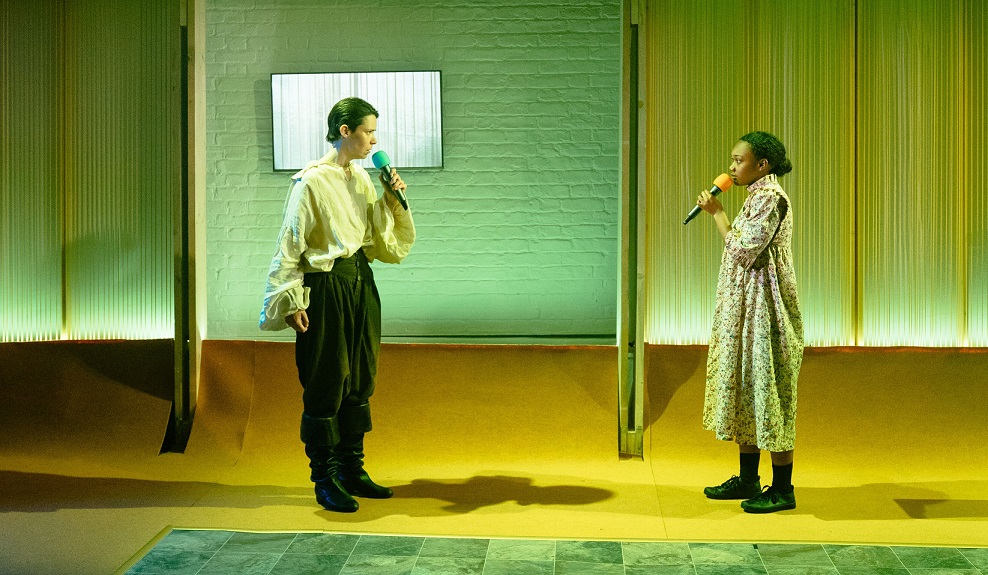The Crucible, The Yard Theatre review - wilfully over-stirred | reviews, news & interviews
The Crucible, The Yard Theatre review - wilfully over-stirred
The Crucible, The Yard Theatre review - wilfully over-stirred
Arthur Miller’s possession drama staged for spectacle

The Crucible is a play that speaks with unrelenting power at times of discord, most of all when the public consciousness looks ripe for manipulation.
I wish I could say that the result was more illuminating. Jay Miller works with a strikingly young cast of nine, the necessary doubling confidently handled and most of the main roles powerfully defined, some close to excellent towards the end of the three-hour run. But they’re up against a collection of directorial ploys that Miller and his production collaborators throw at the show, the effect of which ranges from occasional diversion to outright gimmickry.
It starts out as a paradigm of ensemble work, the cast assembled in what looks like a church hall (complete with spun-thread decor and stove), each occupying a chair marked with the name of their character while the play’s immediate context (complete with stage directions) is sketched out through group narration, with an am-dram effect that is almost radio drama. But gradually they move into the action, the players rising from their seats, their interaction elaborating the balance of these small-town relationships; gradually, too, their diction slips into more defined American accents. It’s begun in modern dress, but Act II moves the Proctor household back to period, at least for the couple themselves, until the court scene of Act III settles on a sort of contemporary totalitarian, a briskly assertive style that convinces, unlike what has come before, as the visual articulation of a particular world. Coherence in costume (Oliver Cronk) and set design (Cécile Trémoilères) is obviously fluid, and the more striking elements here are Josh Anio Grigg’s growingly remorseless soundscapes – just how much does tension have to be wound up? – and Jess Bernberg’s lighting work, which fluctuates between wildly different hues, intimate yellow one minute, cold grey-green the next.
It’s begun in modern dress, but Act II moves the Proctor household back to period, at least for the couple themselves, until the court scene of Act III settles on a sort of contemporary totalitarian, a briskly assertive style that convinces, unlike what has come before, as the visual articulation of a particular world. Coherence in costume (Oliver Cronk) and set design (Cécile Trémoilères) is obviously fluid, and the more striking elements here are Josh Anio Grigg’s growingly remorseless soundscapes – just how much does tension have to be wound up? – and Jess Bernberg’s lighting work, which fluctuates between wildly different hues, intimate yellow one minute, cold grey-green the next.
The impression that spectacle is out to dominate over character becomes even more pronounced after the interval, as Miller winds up the technical add-ons – a karaoke interpolation, angled screen texts and images, microphone work and echo sound, blank-masked aliens lurking (we presume) as witches, flash and strobe effects. It’s a cacophony of stylisation that risks turning the actors into ciphers in a show that looks exaggerated even for a work about possession.
The fact that the cast comes through with distinction is despite rather than because of the production. Emma D’Arcy has an intimate power as Elizabeth Proctor, and there's a later quiet intenstity to Sorcha Groundsell as Mary Warren (their prim visages would look at home in the original Salem setting). As Judge Danforth, who's made into a compilation character here, Jacob James Beswick controls the court with bureaucratic efficiency, dominating those over whom he presides; prime among them is Nina Cassells’ Abigail, convincingly complicated elsewhere but hampered by having to play out her secret meeting scene with Proctor via hand microphone (pictured above).
The vaunted cross-casting of Dunne does nothing to amplify the role, with accompanying vocal and physical uncertainties in fact reducing the character. That said, Miller’s final husband-and-wife encounter is so strong that its prolonged, agonising drama of moral decision can’t fail to move. It achieves a stark power otherwise rare in this over-stirred Crucible.
The future of Arts Journalism
You can stop theartsdesk.com closing!
We urgently need financing to survive. Our fundraising drive has thus far raised £49,000 but we need to reach £100,000 or we will be forced to close. Please contribute here: https://gofund.me/c3f6033d
And if you can forward this information to anyone who might assist, we’d be grateful.

Subscribe to theartsdesk.com
Thank you for continuing to read our work on theartsdesk.com. For unlimited access to every article in its entirety, including our archive of more than 15,000 pieces, we're asking for £5 per month or £40 per year. We feel it's a very good deal, and hope you do too.
To take a subscription now simply click here.
And if you're looking for that extra gift for a friend or family member, why not treat them to a theartsdesk.com gift subscription?
more Theatre
 The Weir, Harold Pinter Theatre review - evasive fantasy, bleak truth and possible community
Three outstanding performances in Conor McPherson’s atmospheric five-hander
The Weir, Harold Pinter Theatre review - evasive fantasy, bleak truth and possible community
Three outstanding performances in Conor McPherson’s atmospheric five-hander
 Dracula, Lyric Hammersmith review - hit-and-miss recasting of the familiar story as feminist diatribe
Morgan Lloyd Malcolm's version puts Mina Harkness centre-stage
Dracula, Lyric Hammersmith review - hit-and-miss recasting of the familiar story as feminist diatribe
Morgan Lloyd Malcolm's version puts Mina Harkness centre-stage
 Reunion, Kiln Theatre review - a stormy night in every sense
Beautifully acted, but desperately grim drama
Reunion, Kiln Theatre review - a stormy night in every sense
Beautifully acted, but desperately grim drama
 The Code, Southwark Playhouse Elephant review - superbly cast, resonant play about the price of fame in Hollywood
Tracie Bennett is outstanding as a ribald, riotous Tallulah Bankhead
The Code, Southwark Playhouse Elephant review - superbly cast, resonant play about the price of fame in Hollywood
Tracie Bennett is outstanding as a ribald, riotous Tallulah Bankhead
 The Lady from the Sea, Bridge Theatre review - flashes of brilliance
Simon Stone refashions Ibsen in his own high-octane image
The Lady from the Sea, Bridge Theatre review - flashes of brilliance
Simon Stone refashions Ibsen in his own high-octane image
 Romans: A Novel, Almeida Theatre review - a uniquely extraordinary work
Alice Birch’s wildly epic family drama is both mind-blowing and exasperating
Romans: A Novel, Almeida Theatre review - a uniquely extraordinary work
Alice Birch’s wildly epic family drama is both mind-blowing and exasperating
 The Producers, Garrick Theatre review - Ve haf vays of making you laugh
You probably know what's coming, but it's such great fun!
The Producers, Garrick Theatre review - Ve haf vays of making you laugh
You probably know what's coming, but it's such great fun!
 Not Your Superwoman, Bush Theatre review - powerful tribute to the plight and perseverance of Black women
Golda Rosheuvel and Letitia Wright excel in a super new play
Not Your Superwoman, Bush Theatre review - powerful tribute to the plight and perseverance of Black women
Golda Rosheuvel and Letitia Wright excel in a super new play
 Cow | Deer, Royal Court review - paradox-rich account of non-human life
Experimental work about nature led by Katie Mitchell is both extraordinary and banal
Cow | Deer, Royal Court review - paradox-rich account of non-human life
Experimental work about nature led by Katie Mitchell is both extraordinary and banal
 Deaf Republic, Royal Court review - beautiful images, shame about the words
Staging of Ukrainian-American Ilya Kaminsky’s anti-war poems is too meta-theatrical
Deaf Republic, Royal Court review - beautiful images, shame about the words
Staging of Ukrainian-American Ilya Kaminsky’s anti-war poems is too meta-theatrical
 Laura Benanti: Nobody Cares, Underbelly Boulevard Soho review - Tony winner makes charming, cheeky London debut
Broadway's acclaimed Cinderella, Louise, and Amalia reaches Soho for a welcome one-night stand
Laura Benanti: Nobody Cares, Underbelly Boulevard Soho review - Tony winner makes charming, cheeky London debut
Broadway's acclaimed Cinderella, Louise, and Amalia reaches Soho for a welcome one-night stand
 The Pitchfork Disney, King's Head Theatre review - blazing with dark energy
Thrilling revival of Philip Ridley’s cult classic confirms its legendary status
The Pitchfork Disney, King's Head Theatre review - blazing with dark energy
Thrilling revival of Philip Ridley’s cult classic confirms its legendary status

Add comment